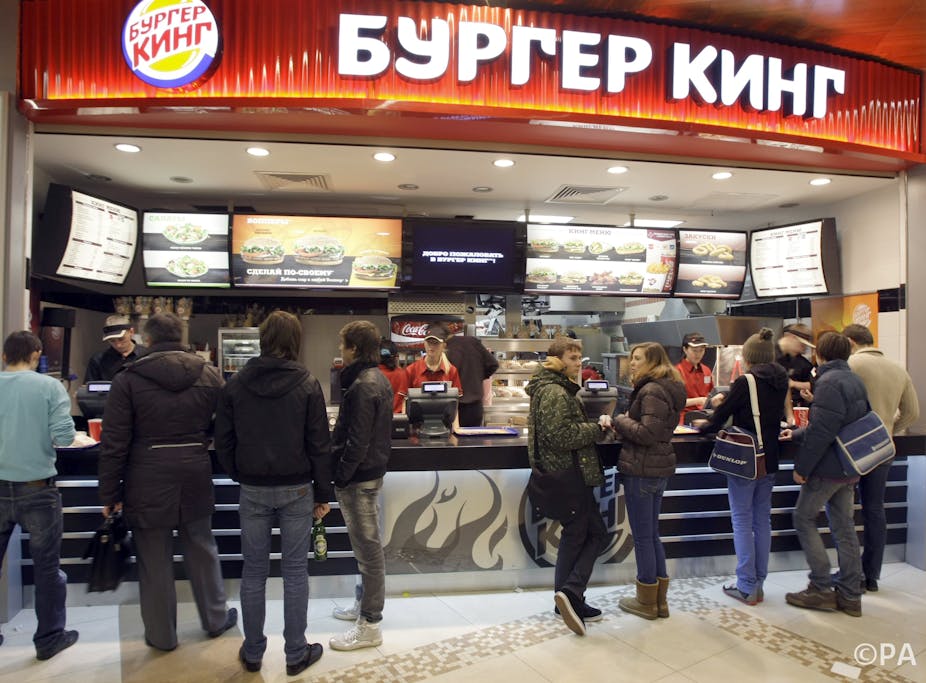With the Crimean parliament voting to join Russia, and EU leaders discussing potential sanctions, the Ukrainian crisis continues to escalate. But what if Russia’s next seizure wasn’t further territory but rather Exxon Mobil’s gas fields, or Volkswagen’s factories?
The Federation Council, the upper house of Russia’s parliament, is considering draft measures that would allow the property and assets of European and US companies to be confiscated in the event of international sanctions against Russia.
At this early stage, it is unlikely that such measures will become official policy. But this should be seen as a signal. Russia’s leaders are demonstrating to the West that they possess the capacity to inflict pain in retaliation to any future sanctions. In doing so, they may also be hoping that US and European companies with substantial business interests in Russia will increase their lobbying to help dilute the substance of any action taken against Russia.
Nevertheless, it does raise the issue of whether Russia would be able to credibly threaten the expropriation of foreign assets as a weapon against the West. In order to assess whether such a weapon could ever be used, it is necessary to answer three related questions. First, what role do foreigners currently play in the Russian economy? Second, are foreigners important to the development of key Russian industries? And finally, what would be the likely effects of any expropriation of foreign assets in Russia?
Foreign investment is on the rise
Over the past two decades, the foreign role in the Russian economy has grown from practically nothing. After the near decade-long recession of the 1990s, strong growth and rising incomes in Russia attracted foreign investment across large swathes of the economy. High profile investors include Exxon-Mobil, BP and Statoil, all of whom are active in Russia’s strategically important oil industry.
But foreigners aren’t just involved in the energy industry. Volkswagen, General Motors and Renault are among the foreign companies producing cars in Russia for Europe’s largest automotive market. Smaller companies are also involved in business services, such as accounting and legal services, manufacturing and other sectors.
The foreign share of investment in the Russian economy is not as high as it is in many of the smaller economies of central and eastern Europe. But it does compare favourably to many other large, populous emerging economies like Brazil and India.
Just under two thirds of the foreign investment in Russia comes from European countries, with Germany and France among the leaders. Although the role of US investment was low for much of the post-Soviet period, it has increased rapidly in recent years, with the US the largest foreign investor into Russia in 2011 and 2012.
Foreign investment is vital for Russia
Foreign investment has grown to the point where it is now vital to the long-term prospects of the Russian economy.
Foreigners bring vital technology and organisational know-how that Russian is unable to produce itself. Take the automotive sector, which attracts 21% of foreign investment projects and more than a third of the jobs created. What used to be a post-Soviet albatross has been transformed by this investment into one of Russia’s fastest growing industries. Foreign investors have also transferred vital technology in the chemical and aerospace industries.
In the energy industry, foreign technology and knowledge is vital to the exploitation of oil and gas fields located deep under the Arctic or underneath the permafrost of eastern Siberia. This is especially important at a time when the older oil fields of western Siberia and the lower Volga basin are becoming exhausted. Without the involvement of the likes of Exxon-Mobil, BP, Statoil and Total in tapping geologically demanding oil deposits, future flows of energy revenues – that keep the political system erected by Putin in place – would be threatened.
Capital flight and a low-tech future?
As foreign companies play such a key role in Russia, anything that might reduce investment would be severely damaging to the economy. Without technology and expertise, modernisation efforts are likely to fail.
The mere creation of any legal basis for the expropriation of foreign assets – whether as a reaction to developments at the global level, or because of domestic political struggles – would be considered a matter of grave concern for foreign companies. Such a development would very likely lead to capital, both foreign and Russian, fleeing the country.
Under such conditions, it would be more difficult to maintain yet alone increase current energy production. Investment – key to long-term structural transformation – would slump. And any hope of Russia acquiring the high-technology productive capabilities that would buttress its claims to great power status would be dashed.
Therefore, while it is always possible that domestic politics might drive the adoption of legislation that would be counter-productive, the enormous economic damage that would be inflicted would surely force the Russian leadership to think long and hard before taking such a self-defeating course of action.

